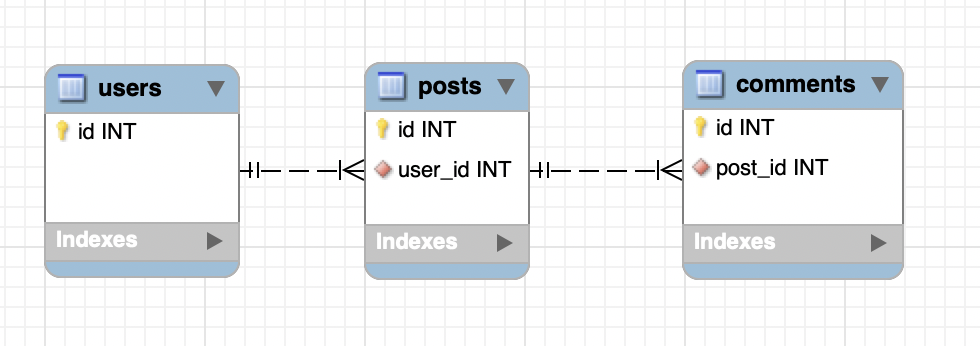- 公開日
ActiveRecordでhas_many, throughとは逆の関連を定義する

目次
TL;DR
has_many+throughの逆の関連の定義には:
belongs_to+throughは使えないdelegateorhas_one+throughが使えるhas_one+throughの方が効率もよく、includesも使えてオススメ
テーブル構成
とあるRailsアプリケーションでこんなテーブル構成があったとします。

Railsモデル構成
ユーザー(User)は複数の記事(Post)をもっていて、その記事は複数のコメント(Comment)を持っている、という状態です。
class User < ApplicationRecord
has_many :posts
end
class Post < ApplicationRecord
belongs_to :user
has_many :comments
end
class Comment < ApplicationRecord
belongs_to :post
end
has_many, through の定義
上記のようなモデル定義においてユーザーモデルから直接コメントモデルへの関連を定義するにはどうしたらよいでしょうか?
答えはhas_many+throughを使うことです。
class User < ApplicationRecord
has_many :posts
has_many :comments, through: :posts
end
class Post < ApplicationRecord
belongs_to :user
has_many :comments
end
class Comment < ApplicationRecord
belongs_to :post
end
下記一行が変更点となります。
has_many :comments, through: :posts
この変更により、特定のユーザーがどんなコメントを持っているかを下記のように一発で引くことができるようになりました。
user = User.find(1)
# User Load (0.3ms) SELECT `users`.* FROM `users` WHERE `users`.`id` = 1 LIMIT 1
user.comments
# Comment Load (0.5ms) SELECT `comments`.* FROM `comments` INNER JOIN `posts` ON `comments`.`post_id` = `posts`.`id` WHERE `posts`.`user_id` = 1 LIMIT 11
ではここで疑問。逆にコメントモデルからPostモデルを省いてユーザーを引くことはできないのでしょうか? つまり has_many, throughの逆の関連はどう定義したらよいのでしょうか?
belongs_to, through は使えない?
has_many, throughが使えるんだから belongs_to, through も使えると思うでしょう? しかし実際に動かしてみると下記のエラーが発生してしまします。
class Comment < ApplicationRecord
belongs_to :post
belongs_to :user, through: :post
end
# => ArgumentError (Unknown key: :through. Valid keys are: :class_name, ...
残念ながらbelongs_toにはthroughというオプションは無いようです。
has_many, throughの逆の関連を定義するには2つの方法があります。
1. delegate を使う方法
1つ目の方法はdelegateを使うことです。具体的にはコメントモデルを下記のように変更します。
class User < ApplicationRecord
has_many :posts
has_many :comments, through: :posts
end
class Post < ApplicationRecord
belongs_to :user
has_many :comments
end
class Comment < ApplicationRecord
belongs_to :post
delegate :user, to: :post
end
下記のようにユーザーを引くことができるようになりました。
> Comment.first.user
# Comment Load (0.3ms) SELECT `comments`.* FROM `comments` ORDER BY `comments`.`id` ASC LIMIT 1
# Post Load (0.4ms) SELECT `posts`.* FROM `posts` WHERE `posts`.`id` = 1 LIMIT 1
# User Load (0.3ms) SELECT `users`.* FROM `users` WHERE `users`.`id` = 1 LIMIT 1
=> #<User id: 1, name: "TEST", created_at: "2019-09-20 15:36:46", updated_at: "2019-09-20 16:34:31">
ご覧のように Comment → Post → User と順にロードされていることがわかります。
2. has_one, through を使う方法
2つ目の方法はhas_one, throughを使うことです。コメントモデルを下記のように変更します。
class User < ApplicationRecord
has_many :posts
has_many :comments, through: :posts
end
class Post < ApplicationRecord
belongs_to :user
has_many :comments
end
class Comment < ApplicationRecord
belongs_to :post
has_one :user, through: :post
end
こちらも同様に下記のようにユーザーを引くことができるようになりました。
> Comment.first.user
# Comment Load (0.3ms) SELECT `comments`.* FROM `comments` ORDER BY `comments`.`id` ASC LIMIT 1
# User Load (0.4ms) SELECT `users`.* FROM `users` INNER JOIN `posts` ON `users`.`id` = `posts`.`user_id` WHERE `posts`.`id` = 1 LIMIT 1
=> #<User id: 1, name: "TEST", created_at: "2019-09-20 15:36:46", updated_at: "2019-09-20 16:34:31">
こちらの方法の定義だと、SQLおよびモデルのLoadがdelegate方式よりも一回分少なく済むので、より低コストでコメントからユーザーを引くことができます。
includes も使うことができる
has_one で定義していると includes も使うことができます。
> Comment.includes(:user).find(1)
# Comment Load (2.9ms) SELECT `comments`.* FROM `comments` WHERE `comments`.`id` = 1 LIMIT 1
# Post Load (0.5ms) SELECT `posts`.* FROM `posts` WHERE `posts`.`id` = 1
# User Load (0.4ms) SELECT `users`.* FROM `users` WHERE `users`.`id` = 1
=> #<Comment id: 1, ...
eager_loadやjoinsも同様に使うことができます。
> Comment.joins(:user).find(1)
# Comment Load (1.0ms) SELECT `comments`.* FROM `comments` INNER JOIN `posts` ON `posts`.`id` = `comments`.`post_id` INNER JOIN `users` ON `users`.`id` = `posts`.`user_id` WHERE `comments`.`id` = 1 LIMIT 1
=> #<Comment id: 1 ...
> Comment.eager_load(:user).find(1)
# SQL (2.4ms) SELECT `comments`.`id` AS t0_r0, `comments`.`post_id` AS t0_r1, `comments`.`content` AS t0_r2, `comments`.`created_at` AS t0_r3, `comments`.`updated_at` AS t0_r4, `ube sers`.`id` AS t1_r0, `users`.`name` AS t1_r1, `users`.`created_at` AS t1_r2, `users`.`updated_at` AS t1_r3 FROM `comments` LEFT OUTER JOIN `posts` ON `posts`.`id` = `comments`.`post_id` LEFT OUTER JOIN `users` ON `users`.`id` = `posts`.`user_id` WHERE `comments`.`id` = 1 LIMIT 1
=> #<Comment id: 1 ...
どちらの方法が良いか?
delegate | has_one+through | |
|---|---|---|
Comment → User 参照のための総クエリ回数 | 3回 | 2回 |
includes joins などが使えるか? | ☓ 使用不可 | ○ 使用可 |
| 定義の意味 | comment からuser への関連をpost に移譲 | comment はpostを通してuserへの関連を1つ持つ |
ということで delegate よりは has_one+through を使うのがオススメです。